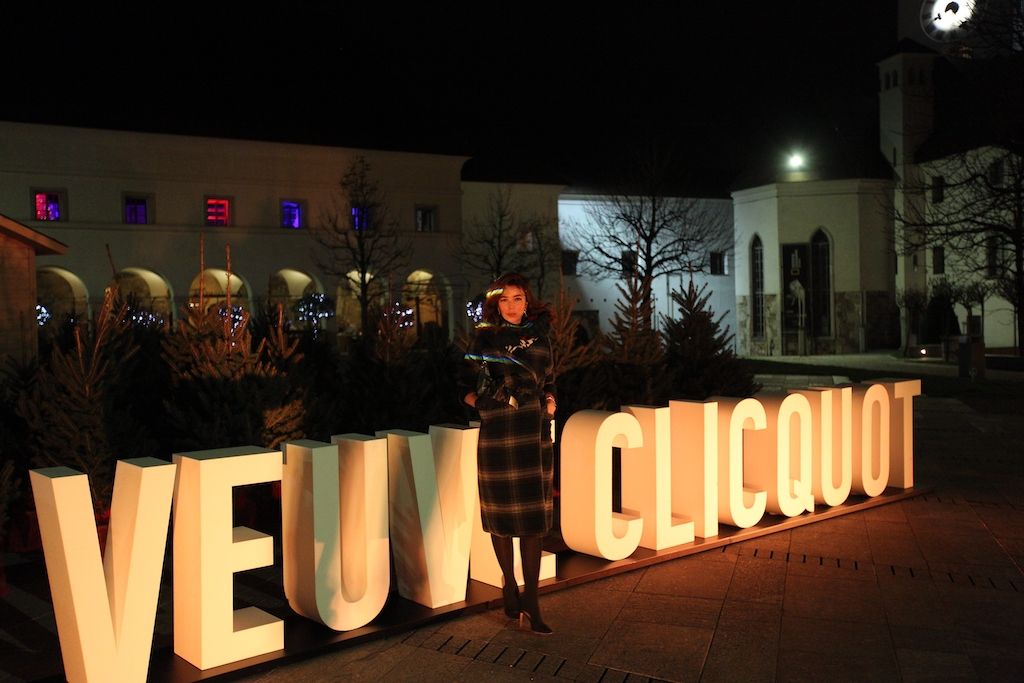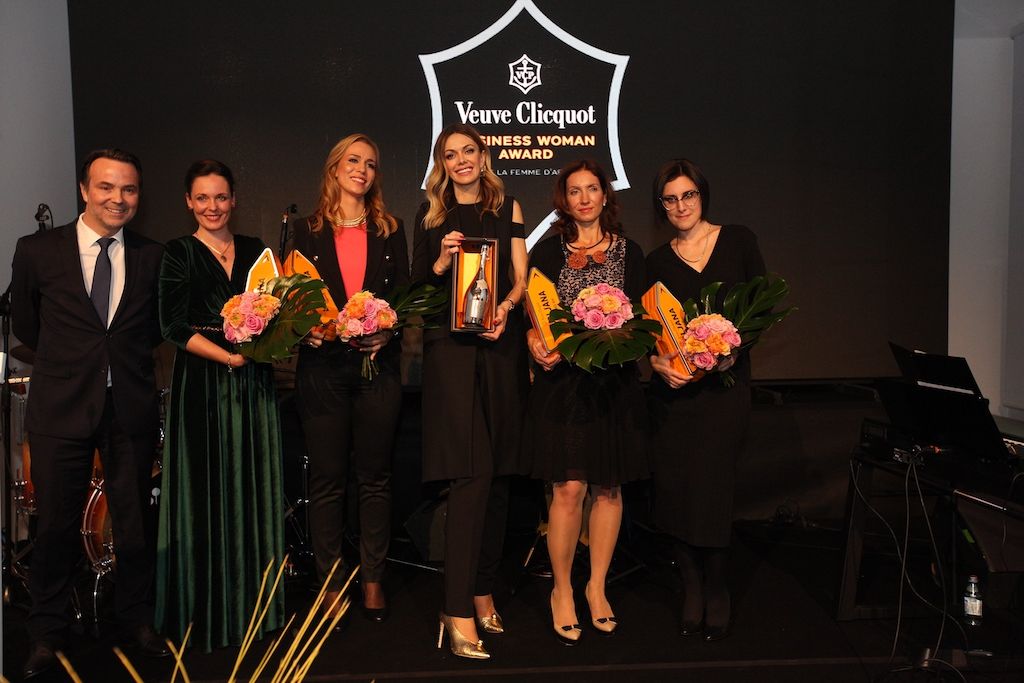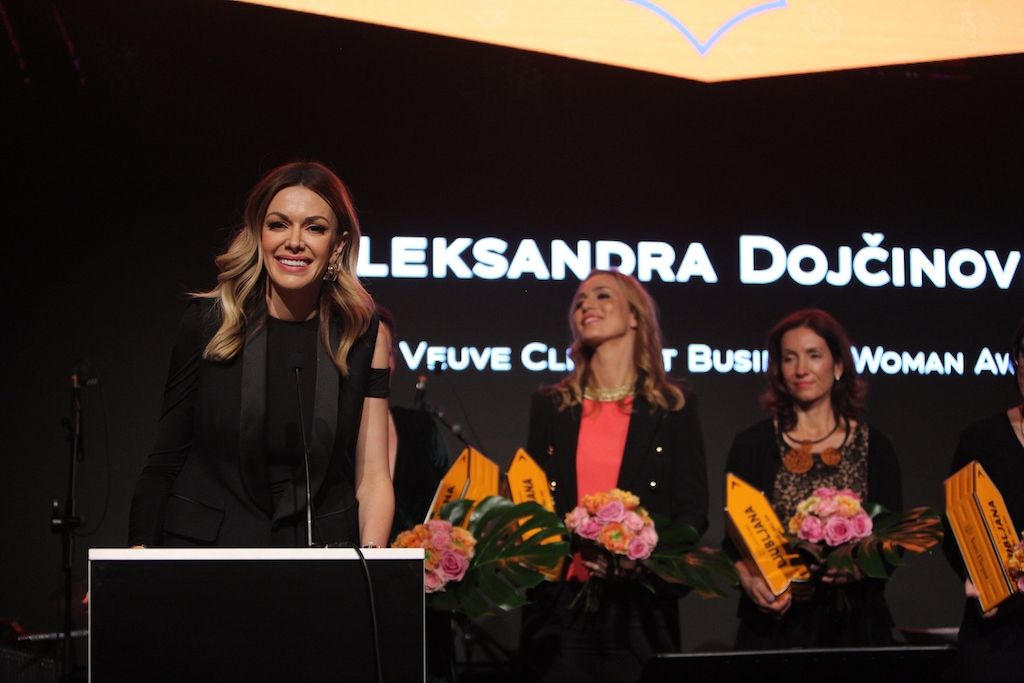Gordana Kovačević Named Most Powerful Businesswoman in Croatia
ZAGREB, Dec 10, 2018 - Ericsson Nikola Tesla Management Board chair Gordana Kovačević was named the most powerful businesswoman in Croatia at the 8th international conference "Women in Business", held in Zagreb last Thursday.
The country's 300 most powerful business women were named at the conference, and the top ten include Energia Naturalis Management Board member Sabina Škrtić, Zagrebački Holding Management Board chair Ana Stojić Deban, European Association of Public Banks Board member Tamara Perko, and Lada Tedeschi Fiorio, deputy chair of the Atlantic Group Supervisory Board.
Euroherc Management Board chair Ivana Bratanić is placed sixth, followed by Philip Morris general director Anita Letica, Croatian Employers Association president Gordana Deranja, the director of Siemens for Croatia and Slovenia, Medeja Lončar, and Coca-Cola HBC Adria director Ruža Tomić Fontana.
Finnish Deputy Ambassador Virpi Turunen, whose country was a partner to the conference, said that Finland was one of the world's least corrupt countries and noted that there was a clear connection between prominent representation of women in managerial positions and a low level of corruption.
Work on gender equality contributes to dealing with the problem of corruption and its effects on the democratic system, Turunen said.
For more on the business issues in Croatia, follow our Business section.
Aleksandra Dojčinović Wins Veuve Clicquot Business Woman Award
In the beautiful atmosphere of the Old Town in Ljubljana, Slovenia, the regional competition for the prestigious Veuve Clicquot Business Woman Award was held on November 29. Five candidates from the region – who had won their national competitions – fought for the prestigious award. In addition to Croatia’s Aleksandra Dojčinović, the nominated businesswomen were Ana Nives Radović from Montenegro, Ana Petrović and Marija Ignjatović from Serbia, and Irena Fonda from Slovenia.
The prestigious award was given to the Croatian representative Aleksandra Dojčinović, who heads the Lei Lou brand. The decision was made by an expert jury chaired by Anna Wlodarz, general director for Moët Hennessy for Central and South Europe, Urška Šefman Sojer, the last year's regional winner from Slovenia, and last year's finalists Nataša Milanović from Serbia, Dejana Ponoš from Montenegro, and Anja Zambelli Čolak from Croatia.
Fashion designer Aleksandra Dojčinović was awarded the Veuve Clicquot Business Woman Award, and she will travel to France in June, where the Business Woman Award Forum will be attended by all the winners of this year's regional competitions.
There are many reasons why Aleksandra Dojčinović is always among the best. The uniquely-Croatian quality is what has been making Aleksandra Dojčinović, the creative director, founder and owner of the Lei Lou fashion brand, different from her competition for the last 11 years. Her company, which nowadays employs some thirty employees, has been expanding internationally for a number of years and currently exports to fifteen countries. Also, her creations have become a common feature of various global events.
Also, Aleksandra has three stores, two of which are in Croatia (Zagreb and Split) and one in Germany (Stuttgart) and a modern online shop. She organizes two superbly-produced fashion shows a year and works with her team of associates on continual self-improvement, investing in new knowledge and contemporary design and production methods. Aleksandra's visionary approach to business has turned Lei Lou into an example of a successful small company in Croatia, so it is no surprise she has been selected as the regional winner of the prestigious Veuve Clicquot Business Woman Award, which is given annually to successful businesswomen around the world.
The award was founded in 1972 in honor of Madame Clicquot, an exceptional French businesswoman known for her courage and entrepreneurial spirit. In 1798, Madame Clicquot married the successful champagne producer Françoise Clicquot. When she became a widow at the age of 27, she took over the company and became the first woman to run a business. She demonstrated her entrepreneurial spirit in 1810 when she produced the first vintage wine in the Champagne region. The star of the evening was, in addition to Aleksandra, the top champagne Veuve Clicquot, enjoyed by all the guests, including numerous regional celebrities from the world of politics, culture and entertainment.
For more on women in Croatia click here.
Photos by: Mirko Janković
Croatian MEP Appointed Rapporteur on Women's Rights in Western Balkans
ZAGREB, November 24, 2018 - Croatian member of the European Parliament and member of its Committee on Women's Rights and Gender Equality (FEMM), Biljana Borzan, has been appointed rapporteur on women rights in Western Balkans, Borzan's office said in a press release on Saturday.
According to the statement, Borzan has for years called for an official position for the region and has finalised a draft resolution on that matter. "This year the EP has responded to my request and it has been put into procedure," she said.
In her resolution, Borzan refers to the poor situation of women on the labour market. Even though women who during their studies are more successful than their male colleagues, they are in a much poorer position on the labour market, they suffer abuse and most often take over caring for children and elderly family members, she said.
"Unfortunately, violence is a burning problem in the region. There aren't enough safe houses. We have unqualified staff to deal with the victims, a slow judiciary and what is worst, examples of unreported cases of violence," she underscored.
Negotiations will commence next week and a vote on the resolution should occur at a European Parliament session in February 2019.
In March this year, Borzan was presented with the MEP Award or EU Oscar for 2017 in the category of women's rights and gender equality.
For more on women rights in Croatia, click here.
Violence against Women Due to Patriarchal Society
ZAGREB, November 23, 2018 - One of the reasons why violence against women is so widespread in Croatia and the whole world are patriarchal social relations, so it is necessary to work on gender equality to reduce the violence, it was said on Friday at a presentation of publications on procedures in sexual violence cases and the elimination of discrimination against women.
The presentation was held on the occasion of International Day for the Elimination of Violence against Women, observed on November 25. "Domestic and sexual violence against women is so widespread... that it's a global problem. All international organisations are trying to find a solution to prevent it, but that's very slow," said Helena Štimac Radin, head of the government's Gender Equality Office.
A 2014 European Union study showed that one in three women had experienced physical or sexual violence after the age of 15, she said, adding that one of the reasons was "that men and women are not equal."
She said the protocol on procedures in cases of sexual violence, which is aligned with the Istanbul Convention and which the government adopted in July, precisely defined the obligations of the ministries of the interior, justice, health and education as well as prosecutors' offices.
Maja Mamula of the Women's Room NGO said sexual violence was one of the gravest, yet least reported crimes which had devastating consequences on victims, their families and society.
She said statistics showed that one in five women would be a victim of rape or attempted rape during her life. A Women's Room survey from 2005 showed that 17% of women were such victims and that 95% did not report it.
"Those who decide to report violence will experience additional trauma. They will be interviewed many times, they will often be interviewed inadequately, proceedings will be long and they will get insufficient psychological help and support," said Mamula.
For more on the position of women in the Croatian society, click here.
Women Entrepreneurs Still Catching Up In Croatia
November 19, 2018 — Women make up over half of Croatia’s population yet represent less than a quarter of its entrepreneurs, according to a new study released by Croatia’s financial agency (FINA) in commemoration of Women’s Entrepreneurship Day.
The figures show women own and operate about 21.9 percent of the 112,084 enterprises in Croatia, compared to the 51.4 percent owned by men.
The majority (56 percent) of female entrepreneurs have set up shop within the service industry. The rest are mostly concentrated in the education, health and welfare sectors.
While the figures may seem low, they are an improvement. The current 21 percent figure is higher than 2011’s 18 percent; women increased their share of Croatia’s private businesses over the last two years, after a slight fall in 2015.
But which Croatian county is the most progressive toward’s female business owners? That title belongs to Bjelovarsko-Bilogorska county, in Northeast Croatia, which has an higher-that-average rate of women-owned businesses. To find the other end of the spectrum, just look at the neighboring county.
Only 18 percent of businesses in Vriovitičko-Podravska County are owned by women, the lost in the country.
The overall number of women-owned businesses improves slightly if you include “mixed” enterprises, owned by both sexes, which make up nearly 11 percent of all businesses in Croatia.
The combined 32 percent those companies make up still doesn’t come close to the number of companies owned by men. The remaining companies are owned by legal entities, or their ownership could not be determined.
Health Ministry Analyses Complaints about Treatment of Women in Hospitals
ZAGREB, November 10, 2018 - The Health Ministry issued a statement on Friday saying that an analysis of complaints submitted by the parents association "Roda" in a campaign called "End the silence" regarding the unprofessional treatment of women by medical staff showed that most of the 401 complaints refer to female patients' dissatisfaction with the administration of anaesthesia during medical procedures, lack of communication or inappropriate communication and the unprofessional conduct of medical staff.
The ministry notes that the number of 401 complaints over a period of more than 15 years (the oldest complaint dates back to 1983) is a relatively small number but that it considers even one complaint to be too many.
It notes that since 400 of the complaints were anonymous and many did not contain information on the time when the events in question occurred or the name of the medical institution concerned, inspections could not be carried out in those cases.
A ministry task force entrusted with analysing the complaints nonetheless analysed all individual complaints and conducted inspections in seven hospitals. The inspections, focusing on gynaecologists, were carried out to check the lawfulness of medical procedures and the professionalism of medical staff, with emphasis on the availability of various types of anaesthesia at childbirth and invasive procedures in gynaecology and obstetrics, the ministry said.
A preliminary analysis established certain differences in the organisation of anaesthesiology health services and anaesthesia administration procedures, with the task force concluding that each patient has the right to adequate anaesthesia in line with medical indications.
Commenting on the recent case of Member of Parliament Ivana Ninčević Lesandrić, who publicly spoke of her negative hospital experience following a miscarriage, and whom the ministry identified only by her initials, the ministry described the procedure applied at the Split Clinical Hospital's emergency service in cases of miscarriage, noting that inadequate communication may be the reason why patients do not understand medical procedures and the types of anaesthesia applied.
As for reports of inappropriate communication or unprofessional conduct, collected in the "End the silence" campaign, the ministry says that it could not establish facts in those cases because the complaints were anonymous. "However, even if there were such cases, the Health Ministry considers them unacceptable, condemns them and expresses regret at them," the ministry says calling on all women patients who have complaints about the quality of healthcare to report their experience immediately to the relevant medical institutions' administration and cite as many relevant data as possible.
It says that based on its analysis, the Health Ministry task force has defined a set of measures to improve healthcare for women.
"Doctor-patient communication is to be improved at all levels of healthcare for women. Medical institutions have the obligation to ensure formal theoretical and practical education in communication skills for employees at all levels, and their obligation is to undergo such training.
"Every woman has the right to adequate analgesia and anaesthesia. Medical staff have the duty to explain to every woman the possibilities of various types of analgesia and anaesthesia as well as indications and counter-indications for their use, with all advantages and risks," the ministry says, noting that rules for the application of different types of analgesia and anaesthesia for specific procedures should be defined by the Croatian Medical Chamber.
The ministry task force also proposes zero tolerance to inappropriate and/or unprofessional conduct and advises patients who encounter such conduct to report it immediately to the relevant medical institutions so that legally defined procedures could be launched.
For more on Croatia’s healthcare sector, click here.
Men in Croatia Earning Much More Than Women
ZAGREB, November 6, 2018 – Men in Croatia annually earned as much as 11,500 kuna more on average than women in 2015, which is almost one and a half average Croatian gross monthly wage more, gender equality ombudswoman Višnja Ljubičić said in Zagreb on Tuesday while presenting the European project "Equal Rights - Equal Pay - Equal Pensions", which aims to achieve gender equality and prevent poverty in Croatia.
The average monthly gross wage in Croatia in 2015 was about 7,500 kuna (1,000 euro) for women and 8,400 kuna (1,130 euro) for men, which means that the average monthly wage for women was 88.7 percent of that for men, the ombudsman said.
She warned that the gender pay gap leads to a pension gap, as a result of which women face social exclusion, poverty and economic dependence on the husband or partner after leaving the labour market.
The project "Equal Rights - Equal Pay - Equal Pensions" aims to ensure standards and measures that will raise awareness of this problem with a view to reducing the risk of poverty for women.
The 470,000 euro project was launched on October 1 and will last until the end of September 2020. It is the fourth European project to be implemented by the gender equality ombudsman in the last five years through which a total of 2 million euro has been absorbed.
As part of the project, an in-depth study of the situation will be carried out at national level, educational programmes will be designed, workshops will be held in four cities and a national legislative framework for equal pay and pensions is expected to be drawn up. The target groups of the project include executive and legislative authorities, public- and private-sector companies, trade unions, and secondary school students.
For more on the position of women in Croatia, click here.
Women as Entrepreneurs Important for Economic Growth
ZAGREB, November 6, 2018 - The state is not aware of the potential of female entrepreneurship, and it is business women who are affected the most by anti-entrepreneurial climate and social barriers, it was said at a ceremony organised in Zagreb on Tuesday by the Women in Adria network for recipients of this year's awards for the best female entrepreneurs.
The founder of the network, Ivana Matić, said that she believed in the development of business on the Croatian market and exports and that she expected state authorities to help in efforts aimed at job creation.
She also said that most businesses led by females are micro businesses, which means that women in those businesses are both the director and the main worker.
Croatian Association of Employers president Gordana Deranja called on local communities to be more engaged in the development of female entrepreneurship. In that context, she warned that every fourth local community does not have institutions catering for preschool children or the elderly who need round-the-clock care, which is why women lack employment opportunities as in most cases it is women who care for children and the elderly.
In order to enable women to be employed or self-employed, it is essential to open kindergartens and day-care centres for the elderly. That requires changes in the society, Deranja said. She added that "females should be encouraged to start up their own businesses and take over responsible positions in companies in which they are employed."
Canada's Deputy Ambassador Emily Nicholson said that the Canadian government promoted diversity and inclusion as an integral part of the creation of an economy suiting everybody. The companies that promote gender diversity in their executive positions achieve better financial results and promote innovativeness, thus contributing to economic growth, the diplomat said.
To read more about the position of women in Croatia, click here.
Croatian Businesswoman to Head Coca-Cola in Central and Eastern Europe
Croatian businesswoman Lana Popović is the new head of Coca-Cola’s Group for Central and Eastern Europe.
Medieval Practices at Croatian Hospitals Revealed
ZAGREB, October 12, 2018 - The head of the Clinic for Women's Diseases at the Clinical Hospital Centre (KBC) in Split, Deni Karelović, denied on Friday the statement made by an opposition lawmaker in the Croatian parliament on Thursday that she had undergone curettage at the KBC Split without anaesthesia.




